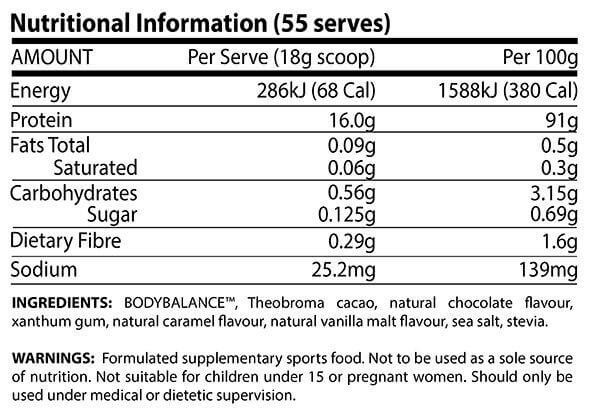ATP SCIENCE
ATP SCIENCE - NOWAY BODYBALANCE COLLAGEN PROTEIN - 1KG
ATP SCIENCE - NOWAY BODYBALANCE COLLAGEN PROTEIN - 1KG
5.0 / 5.0
(1) 1 total reviews
Couldn't load pickup availability
NOWAY BODYBALANCE COLLAGEN PROTEIN
30% of the protein in your body is collagen. Muscles are made largely of collagen (not whey protein) so it would make sense that consuming collagen benefits muscle mass and strength. When you supplement with collagen, research has found that it:
- Supports and Promotes Muscle Mass
- Supports and Promotes Muscle Strength
- Supports and Promotes Lean Body Mass
- Stimulates and Boosts Collagen Production
- Increases Pro-Collagen and Elastin
BODYBALANCE COLLAGEN
Not all collagens are created equal. BODYBALANCE collagen is the King of Collagen for your muscles – and it is backed by some very cool studies.
In 2021, a randomized controlled study compared whey protein with collagen (BODYBALANCE). Researchers measured fat-free mass changes, muscle strength and body fat changes. In the lucky group who got the BODYBALANCE collagen, they increased their fat-free mass (muscle) by 3.42kg, whereas the whey group only put on 2.27kg of lean tissue.
In another study, women who trained were either given a placebo or 15g of BODYBALANCE collagen. Once again, the results clearly showed that the women taking BODYBALANCE increased their muscle mass far superior to training alone.
HOW IS BODYBALANCE BETTER?
While collagen itself is very high in protein, that is only half the story. BODYBALANCE is made of collagen peptides, which act as an instructor to a specific task, that is, they teach the body to build more lean mass. The protein fraction then goes ahead to build the muscle mass. When compared to other proteins, BODYBALANCE gives you '2 for the price of 1', combining the peptide teaching the body to build muscle, and the protein itself.
HOW DOES IT TASTE?
Amazing. Collagen taste great in milkshake style flavours like Chocolate and Vanilla but excels in Juicy style flavours. We believe the juicy range tastes like a refreshing cordial and is very easy to drink especially on a hot summers day when you might say “Milk was a bad choice”. We have a huge range of flavours to choose from including Chocolate, Vanilla, REAL Ice Coffee and Juicy styles like Pink Lemonade, Wild Berry and refreshing Pineapple.
FREE OF THE NASTIES!
At ATP Science, we are not fans of artificial stuff. All ATP Products, including NOWAY, are free from artificial sweeteners, colours and flavours. All our our flavours are propylene glycol free. NOWAY is also dairy and gluten free and of course, gut friendly.
DIRECTIONS OF USE
Take 18g of NOWAY® Collagen in 250ml of cold water as a daily protein supplement. After exercise, consume 18g of NOWAY® Juicy Collagen to increase muscle mass and growth. 18g of NOWAY® Collagen consumed throughout the day when you are hungry may stop you from eating something naughty as it increases fullness and may reduce excessive calories at the next meal.
Collagen used in the Noway Range is sourced from High-Quality Bovine from Brazil by some very smart German Scientists . Bovine collagen offers a diverse range of collagen types to the consumer.
CLINICAL REFERENCES
[1] Paul C, Leser S, Oesser S. Significant Amounts of Functional Collagen Peptides Can Be Incorporated in the Diet While Maintaining Indispensable Amino Acid Balance. Nutrients. 2019 May 15;11(5):1079. doi: 10.3390/nu11051079.
[2] Zdzieblik D, Jendricke P, Oesser S, Gollhofer A, König D. The Influence of Specific Bioactive Collagen Peptides on Body Composition and Muscle Strength in Middle-Aged, Untrained Men: A Randomized Controlled Trial. Int J Environ Res Public Health. 2021 Apr 30;18(9):4837. doi: 10.3390/ijerph18094837.
[3] Jendricke P, Centner C, Zdzieblik D, Gollhofer A, König D. Specific Collagen Peptides in Combination with Resistance Training Improve Body Composition and Regional Muscle Strength in Premenopausal Women: A Randomized Controlled Trial. Nutrients. 2019 Apr 20;11(4):892. doi: 10.3390/nu11040892.
Share







